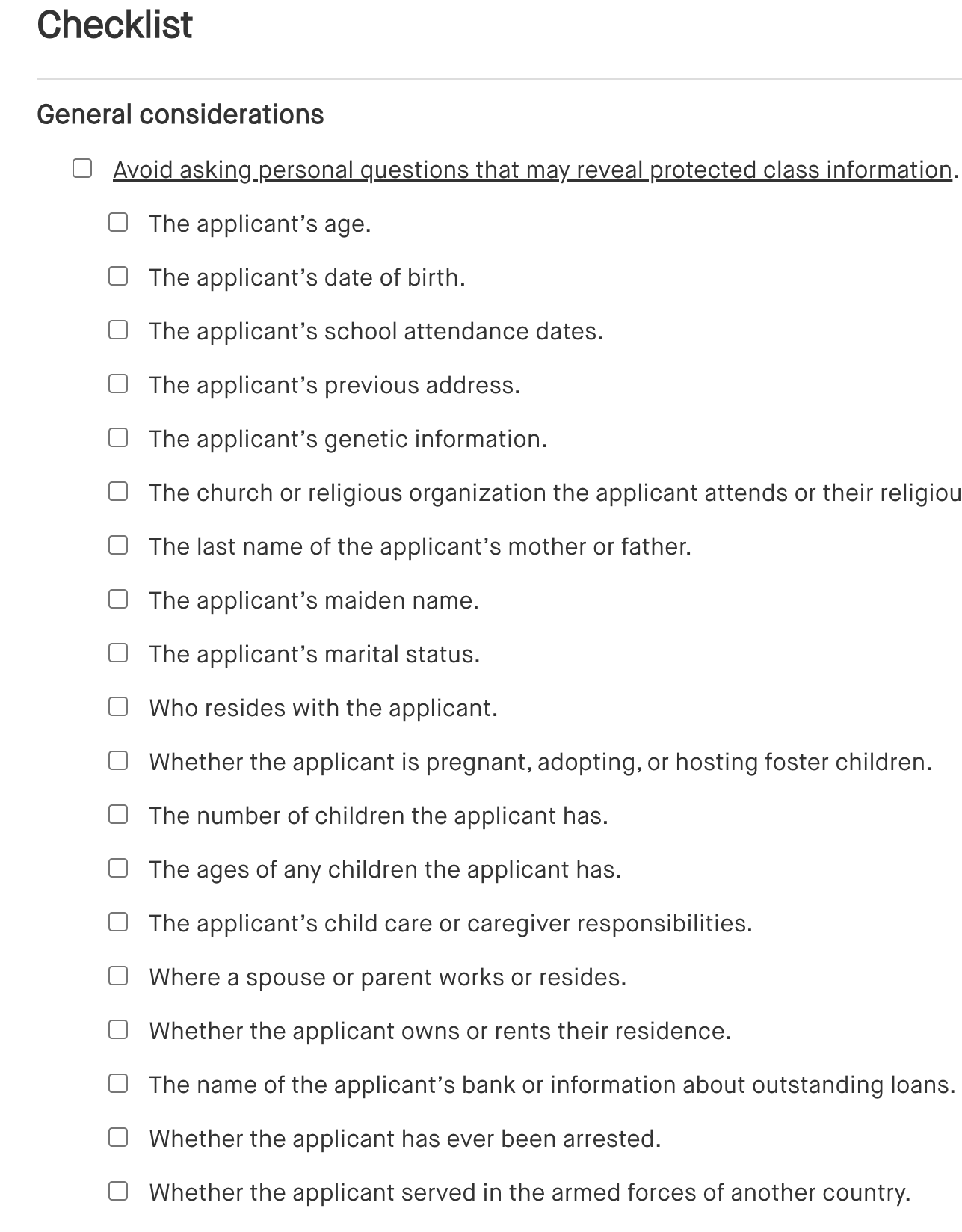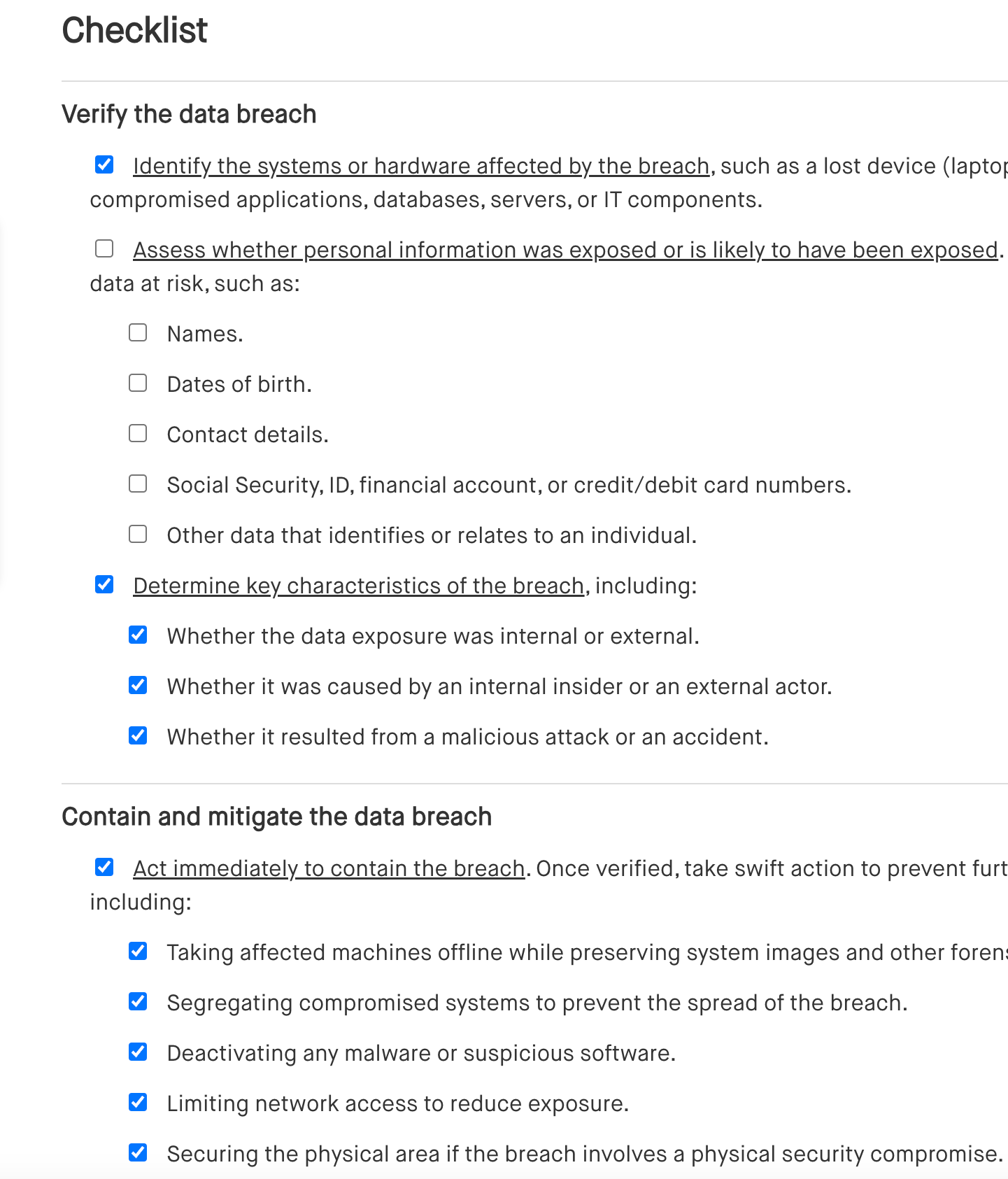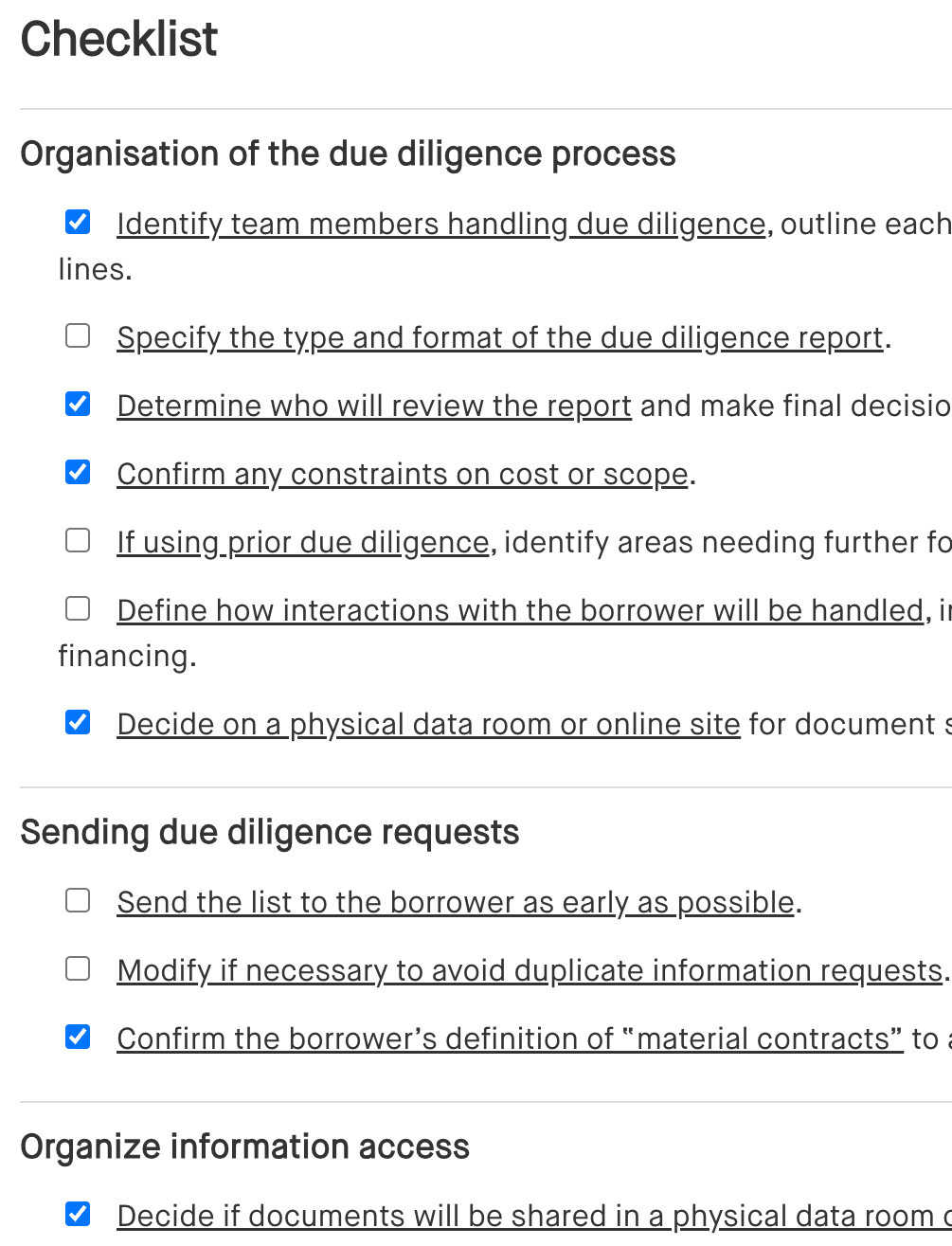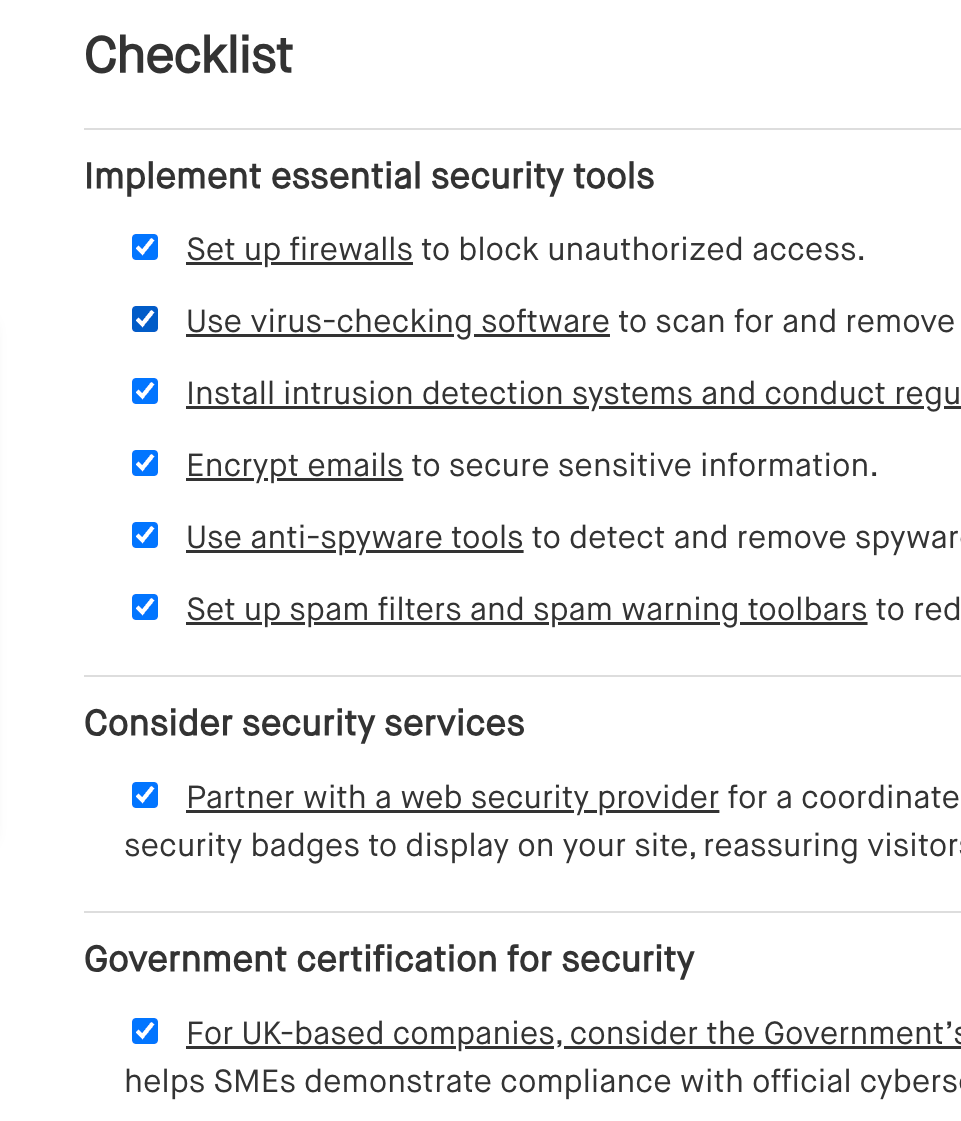Avoid discriminatory questions in interviews: Free checklist
Start a new document with this content. Open the editor to build from scratch — paste in what you need and keep writing.

Avoid discriminatory questions in interviews checklist
Hiring the right talent requires a fair and inclusive process. This checklist helps employers and interviewers avoid discriminatory questions that could expose the company to legal risks or bias. By focusing on job-related qualifications and ensuring compliance with employment laws, this checklist promotes an equitable interview process for all candidates.
Using this checklist ensures that interviews remain professional, compliant, and focused on the applicant's ability to perform the job, rather than on personal characteristics that may suggest discrimination.
How to use this avoid discriminatory questions in interviews checklist
This checklist provides a comprehensive framework for avoiding inappropriate or illegal questions during interviews, helping maintain a fair, compliant process. Here’s how to make the most of it:
- Familiarize yourself with the checklist: Start by thoroughly reviewing each section to understand the types of questions that could lead to potential discrimination claims. Knowing the specific questions to avoid and why helps prevent any misunderstandings during the interview process.
- Apply the checklist to all interviews: Make sure this checklist is used for every interview, regardless of the role or candidate. This helps ensure that all interviewers ask consistent, job-related questions that are relevant to the position, promoting fairness and reducing the risk of bias.
- Train your team: All employees involved in the hiring process should be trained to follow the checklist. This training helps ensure everyone understands how to avoid discrimination, and why it’s essential to focus on qualifications, rather than personal or irrelevant factors.
- Document and update regularly: Keep a record of each interview conducted using this checklist. This documentation will provide a useful reference in case of any disputes, and it helps track compliance with employment laws. Additionally, make sure to review and update the checklist regularly to reflect changes in discrimination laws or company policies.
- Incorporate it into interview planning: Before interviews, use the checklist as part of the preparation process to ensure that only appropriate, job-related questions are included. This proactive approach helps interviewers stay focused on evaluating the candidate’s abilities and suitability for the role.
Checklist
General considerations
[ ] Avoid asking personal questions that may reveal protected class information. Specifically, do not ask:
[ ] The applicant’s age.
[ ] The applicant’s date of birth.
[ ] The applicant’s school attendance dates.
[ ] The applicant’s previous address.
[ ] The applicant’s genetic information.
[ ] The church or religious organization the applicant attends or their religious leader’s name.
[ ] The last name of the applicant’s mother or father.
[ ] The applicant’s maiden name.
[ ] The applicant’s marital status.
[ ] Who resides with the applicant.
[ ] Whether the applicant is pregnant, adopting, or hosting foster children.
[ ] The number of children the applicant has.
[ ] The ages of any children the applicant has.
[ ] The applicant’s child care or caregiver responsibilities.
[ ] Where a spouse or parent works or resides.
[ ] Whether the applicant owns or rents their residence.
[ ] The name of the applicant’s bank or information about outstanding loans.
[ ] Whether the applicant has ever been arrested.
[ ] Whether the applicant served in the armed forces of another country.
[ ] Whether the applicant served in the US military, and their discharge status.
[ ] Whether the applicant will need to miss work for uniformed service.
[ ] The applicant’s sexual orientation.
[ ] What clubs the applicant belongs to.
[ ] The applicant’s foreign language skills (unless job-related).
[ ] The applicant’s support for unionization or past union membership.
[ ] Whether the applicant has had wages garnished or declared bankruptcy.
[ ] Whether the applicant has filed for or received workers’ compensation benefits.
[ ] The applicant's views on marital status titles.
[ ] Why the applicant is not married.
[ ] The name of the applicant’s spouse.
[ ] The employment status or income of the applicant’s spouse.
[ ] The applicant’s feelings about working with people from different protected classes.
[ ] Whether the applicant would have difficulty working with a supervisor of a different protected class.
[ ] Whether the applicant has ever received public assistance.
[ ] The applicant’s nationality or place of birth.
[ ] Whether the applicant is a US citizen.
[ ] Whether English is the applicant’s native language.
[ ] Whether the applicant requires specific medical benefits.
[ ] Whether the applicant would need to miss work for religious services or holidays.
[ ] Questions about family medical history.
[ ] The applicant’s political affiliations.
[ ] Whether the applicant has a medical marijuana card.
[ ] Whether the applicant has filed for unemployment insurance benefits.
[ ] Whether the applicant has taken legal action against a former employer.
[ ] Whether the applicant has acted as a whistleblower against a former employer.
Disability related questions
[ ] Avoid disability-related questions that indicate bias. These should not be asked:
[ ] Whether the applicant has a disability that may affect job performance.
[ ] Whether the applicant has a disability in general.
[ ] Whether the applicant is in good health.
[ ] Whether the applicant has ever received therapy.
[ ] Whether the applicant has ever been injured.
[ ] Whether the applicant has had a major illness in recent years.
[ ] How the applicant became disabled.
[ ] What the applicant’s prognosis is.
[ ] How often the applicant needs to leave work for treatment.
[ ] Whether the applicant has taken leave from work before.
[ ] Whether the applicant will need time off for treatment.
[ ] Whether the applicant has had a drinking or drug problem.
[ ] Whether any family or acquaintances have a disability.
[ ] What prescriptions the applicant is taking.
[ ] How many sick days the applicant took last year.
[ ] Whether the applicant has or had depression.
Appropriate disability-related questions
[ ] Inform applicants about attendance and punctuality requirements and ask if they can comply (with or without accommodation).
[ ] Ask about ability to perform essential job functions (with or without accommodation), such as:
[ ] Whether the applicant can stand for two hours at a time.
[ ] Whether the applicant can carry 50 pounds from one location to another.
[ ] Ask the applicant to describe or demonstrate job performance (with or without accommodation).
Benefits of using an avoid discriminatory questions in interviews checklist
An avoid discriminatory questions in interviews checklist helps you maintain a legally compliant and unbiased hiring process. Here’s how it benefits you:
- Prevent legal issues: Following the checklist helps minimize the risk of asking discriminatory questions that could lead to lawsuits or regulatory fines. It ensures your hiring process aligns with anti-discrimination laws, such as Title VII of the Civil Rights Act and the ADA, safeguarding your business from costly legal complications.
- Ensure consistency: The checklist standardizes your interview process, ensuring every candidate is asked relevant, job-related questions. This consistency promotes fairness and helps avoid any unintentional biases that could arise from off-the-cuff or inappropriate questions.
- Promote inclusivity: Focusing strictly on qualifications and essential job functions helps foster an inclusive hiring environment. By avoiding questions about personal characteristics like age, religion, or family status, you can attract a more diverse pool of talent and create a workplace that values merit and ability.
- Protect your brand: Conducting fair and legally compliant interviews not only reduces legal risks but also enhances your company’s reputation as an equal opportunity employer. Demonstrating a commitment to non-discrimination reflects positively on your brand, attracting top talent and building trust with candidates and the broader community.
- Improve interviewer training: Using the checklist as a training tool for interviewers helps them stay aware of potential pitfalls in conversations and reinforces best practices. This ensures that your hiring team is well-prepared and confident in conducting non-discriminatory interviews.
Frequently asked questions (FAQs)

Details the critical steps to take in response to a data breach, including notification, investigation, containment, and implementing corrective actions.

Outlines key areas for lenders to review during legal due diligence, ensuring thorough assessment of the borrower’s legal standing, risks, and obligations.

Outlines essential measures to safeguard your website from attacks, focusing on security protocols, regular updates, and proactive threat monitoring.